

Stories Matter Application v1.5.1c. Phase II of the Stories Matter Application – A New Media Alternative to Oral History Transcription The Stories Matter Application is designed to be both Mac and PC compatible.
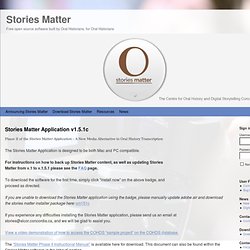
For instructions on how to back up Stories Matter content, as well as updating Stories Matter from v.1 to v.1.5.1 please see the FAQ page. Text Analysis Overview - Welcome. Welcome to Researchware, Inc. Qualitative economics. Qualitative economics refers to representation and analysis of information about the direction of change (+, -, or 0) in some economic variable(s) as related to change of some other economic variable(s).
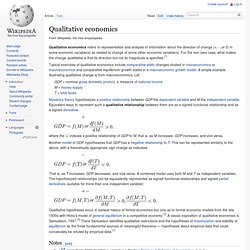
For the non-zero case, what makes the change qualitative is that its direction but not its magnitude is specified.[1] Typical exercises of qualitative economics include comparative-static changes studied in microeconomics or macroeconomics and comparative equilibrium-growth states in a macroeconomic growth model. Sensemaking. In information science the term is most often written as "sense-making.
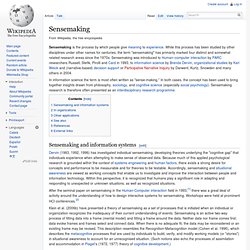
" In both cases, the concept has been used to bring together insights drawn from philosophy, sociology, and cognitive science (especially social psychology). Sensemaking research is therefore often presented as an interdisciplinary research programme. Sensemaking and information systems[edit] Dervin (1983, 1992, 1996) has investigated individual sensemaking, developing theories underlying the "cognitive gap" that individuals experience when attempting to make sense of observed data. Qualitative research. In the conventional view, qualitative methods produce information only on the particular cases studied, and any more general conclusions are only propositions (informed assertions).

Quantitative methods can then be used to seek empirical support for such research hypotheses. History[edit] Data collection[edit] Qualitative researchers face many choices related to data collection ranging from grounded theory practice, narratology, storytelling, classical ethnography, or shadowing. Qualitative methods are also loosely present in other methodological approaches, such as action research or actor-network theory. Qualitative research often categorizes data into patterns as the primary basis for organizing and reporting results. The ways of participating and observing can vary widely from setting to setting. The data that is obtained is streamlined to a definite theme or pattern. Some distinctive qualitative methods are the use of focus groups and key informant interviews. 10. Quantitative marketing research. Quantitative marketing research is the application of quantitative research techniques to the field of marketing.

It has roots in both the positivist view of the world, and the modern marketing viewpoint that marketing is an interactive process in which both the buyer and seller reach a satisfying agreement on the "four Ps" of marketing: Product, Price, Place (location) and Promotion. Scope and requirements[edit] Typical general procedure[edit] Simply put, there are five major and important steps involved in the research process: A brief discussion on these steps is: The design step may involve a pilot study in order to discover any hidden issues. Statistical analysis[edit] The data acquired for quantitative marketing research can be analysed by almost any of the range of techniques of statistical analysis, which can be broadly divided into descriptive statistics and statistical inference. Positivism. Positivism is the philosophy of science that information derived from logical and mathematical treatments and reports of sensory experience is the exclusive source of all authoritative knowledge,[1] and that there is valid knowledge (truth) only in this derived knowledge.[2] Verified data received from the senses are known as empirical evidence.[1] Positivism holds that society, like the physical world, operates according to general laws.
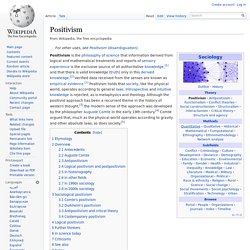
Antipositivism. Antipositivism (also known as interpretivism or negativism) is the belief in social science that the social realm may not be subject to the same methods of investigation as the natural world; that academics must reject[need quotation to verify] empiricism[dubious ] and the scientific method in the conduct of social research.
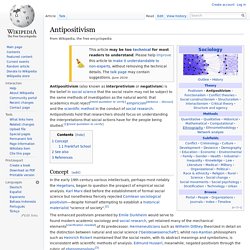
Antipositivists hold that researchers should focus on understanding the interpretations that social actions have for the people being studied.[1][need quotation to verify] Concept[edit] In the early 19th century various intellectuals, perhaps most notably the Hegelians, began to question the prospect of empirical social analysis. Karl Marx died before the establishment of formal social science but nonetheless fiercely rejected Comtean sociological positivism—despite himself attempting to establish a historical materialist "science of society".[2] Computer assisted qualitative data analysis software. Definition[edit] CAQDAS is used in psychology, marketing research, ethnography, and other social sciences.

The CAQDAS Networking project[1] lists the following tools. A CAQDAS program should have: Content searching toolsCoding toolsLinking toolsMapping or networking toolsQuery toolsWriting and annotation tools. [Public Comment Analysis Toolkit] Home Page. Dedoose. Dedoose is a web application for qualitative and mixed methods research developed by professors from UCLA, and is the successor to EthnoNotes.
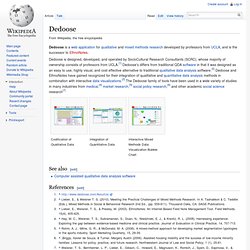
Dedoose is designed, developed, and operated by SocioCultural Research Consultants (SCRC), whose majority of ownership consists of professors from UCLA.[1] Dedoose's differs from traditional QDA software in that it was designed as an easy to use, highly visual, and cost effective alternative to traditional qualitative data analysis software.[2] Dedoose and EthnoNotes have gained recognized for their integration of qualitative and quantitative data analysis methods in combination with interactive data visualizations.[3] The Dedoose family of tools have been used in a wide variety of studies in many industries from medical,[4] market research,[5] social policy research,[6] and other academic social science research[7]